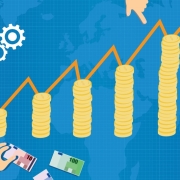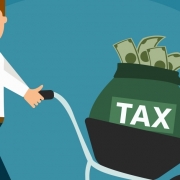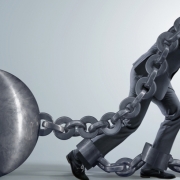Twelve-year-old Lucie Wise couldn’t wait to open her own business. On three separate occasions, she had accompanied her mother to the Children’s Entrepreneur Market—an expo of child-run businesses hosted annually by the Utah nonprofit Libertas Institute—dreaming of the day she could set up her own booth and sell her wares to curious passersby.
Lucie’s experience as a spectator at prior markets had given her time to think long and hard about what kind of company she wanted to start. Getting a jumpstart on the summer, when she would make her debut at the Children’s Entrepreneur Market, she planted 500 flower seeds in the months leading up to her first event. Once the flowers bloomed, she arranged them into beautiful bouquets to sell to her customers.
Lucie’s enthusiasm for running her own business is exactly the kind of mindset the Children’s Entrepreneur Market has been trying to cultivate in the three years since it began.
Hosted throughout the summer in different cities across Utah, these events give kids the opportunity to learn entrepreneurship firsthand while also getting to earn and manage real money. And these aren’t just your typical lemonade stands and bake sales.
Lucie and her fellow kidtrepreneurs are receiving a crash course in runaway taxation from local officials who came to collect sales tax.
Like Lucie, many children are coming up with original ideas for products and services, bringing them to life, paying for booth space, and trying their luck in the marketplace. While the Children’s Market is intended to teach children to love entrepreneurship, one thing it isn’t supposed to do is crush their spirit with the harsh realities of government overreach.
Unfortunately, that’s precisely what’s happening. Lucie and her fellow kidtrepreneurs are receiving a crash course in runaway taxation from local officials who came to collect sales tax on each of their businesses—an action one activist calls unlawful.
Utah’s Entrepreneurial Spirit
Entrepreneurship is inextricably woven into the culture of Utah. Nicknamed the “Beehive State” as a nod to the incomparable work ethic of bees and with its state seal featuring the word “industry,” Utah was founded on the belief that individuals should take pride in hard work and the freedom to provide for themselves. This belief has helped foster an environment where entrepreneurs feel empowered to create value and provide mutual benefit for consumers in the state.
To keep this entrepreneurial spirit alive and inspire the next generation of Utahns, each year the Libertas Institute—an organization dedicated to government accountability, economic freedom, and individual liberty—organizes the Children’s Entrepreneur Market.
Since it began, the Market has been held in 10 locations across the state, housed 1,400 booths, attracted 5,000 customers, and given 3,000 children the rare chance to engage in voluntary exchange with their patrons.
Take nine-year-old Ezra Callis, for example, who charges customers $1 to take a picture with his goats. For an additional 25 cents, you can purchase food to feed the goats. Unlike other children participating in the event, who knew exactly what they were going to spend their earnings on, Callis said, “I have no clue what I am going to do with my money. I just like earning money.”
As the event came to a close, city officials came around with something veteran participants had never encountered before: tax forms.
Amalyssa Sudweeks is 15 years old and has turned her love of making decorative jewelry into a profitable business. Her experience at the Children’s Entrepreneur Market has inspired her to set her sights higher. “I’m trying to start an Etsy store,” she said. Other examples of child-run businesses featured at the market include homemade meat rubs, homemade wall organization calendars, carnival games, strawberry jam, tooth fairy boxes, and 3D-printed Pokemon.
On August 7, the Children’s Entrepreneur Market was held in Spanish Fork, where thousands of people walked past booths sampling products and purchasing goods from these young business people. As the event came to a close and the children began to close up shop, city officials came around with something veteran participants had never encountered before: tax forms.
To everyone’s surprise, the city is insisting that each child pays sales tax revenue to the State Tax Commission this year. In fact, even kids who did not earn a dime at the market are still obligated to file tax forms with the state.
After years of hosting this event in different cities in the state, this is the first instance of any municipality trying to collect sales tax from these kids, organizers and attendees say. Danyelle Payne, mother to two kidtrepreneurs who participated in the event, expressed her disdain for what Spanish Fork is doing, especially since it is the parents who will truly have to deal with this.
“We work on this all summer. We sold out last year. It looks like mom’s taking the hit on the taxes this year,” she said.
This isn’t sitting well with Libertas founder and president Connor Boyack, either. He insists that the city’s action is unlawful.
Since the Market is only a four-hour long event, asking children to pay sales tax would be akin to asking a child-run lemonade business to fork over a portion of their earnings to the state.
Boyack points out that subsection 13 of the state sales tax statute protects businesses of this nature from being made to report or pay sales tax since they are not engaging in regular commerce. Since the Market is only a four-hour long event, asking children to pay sales tax would be akin to asking a child-run lemonade business to fork over a portion of their earnings to the state—something almost no one would stand for in good conscience if it started happening.
“The law is pretty clear that if a child sells lemonade on their sidewalk, they don’t have to collect and remit the sales tax because they’re not a regular business—their activity is inherently irregular and infrequent,” Boyack told FEE.
But the Utah Tax Commission argues—apparently without any law to back them up—that if that same child sells their lemonade as part of our Children’s Entrepreneur Market, or another organized event, they magically lose their exemption and have to fill out complicated tax forms and pay the tax.
Spanish Fork spokesman Scott Aylett commented, “We’re pretty objective with the law. We expect vendors to pay taxes to the state.”
Yet, this seems a bit odd since the subsection actually explicitly protects businesses of this kind from being subject to paying sales tax. However, since the Children’s Market is an organized event, Aylett and other Spanish Fork officials argue, this subjects the children to taxation.
“At the end of the day it’s between them (the entrepreneurs) and the Tax Commission,” Aylett commented. “It doesn’t matter if they’re 10 or 100 (years old).”
Boyack is refusing to take this lying down. Libertas is working with State Sen. Jacob Anderegg to open a bill fill to address this issue and, as Boyack hopes, shut it down before more kids are burdened with tax forms. Boyack sees this as laziness on the part of the commission, which would rather make everyone fill out the forms and pay taxes instead of looking at which individuals are actually legally required to file paperwork.
Boyak commented:
It’s one thing to force kids to do this if it’s the law, but in this case it’s not—it’s a handful of bureaucrats lazily wanting to make all event vendors pay the tax rather than going to the trouble of identifying which ones are exempt and which ones aren’t.
In the meantime, Boyack has instructed parents to claim “0” on the tax forms before sending them back to the state.
As Boyack himself once said, “Let’s at least give kids a taste of the free market before the crushing bureaucracy weighs in upon them.”
In Defense of Entrepreneurship and Liberty
Unfortunately for Spanish Fork, Boyack is well versed in standing up for child entrepreneurs against the long arm of the state. Libertas has already been extremely successful in working with the state legislature to create and pass laws that favor economic liberty—like protecting children entrepreneurs from excessive regulation.
Boyack has decided to use this as a teaching moment.
Just two years ago, Libertas was integral in the creation and passage of Senate Bill 81, which amended existing laws requiring occupational licenses and permits for certain businesses, specifically those run by minors under the age of 18. However, the new law also helps adults by demolishing any fees associated with the required permits. Utah residents over 18 still have to obtain the government’s permission before operating a home-based business, but they are no longer forced to pay exorbitant fees—a win for entrepreneurs within the state.
Boyack, who is also the author of the Tuttle Twins book series that teaches children about entrepreneurship, economics, and the free market in easy to understand terms, has decided to use this as a teaching moment.
“As upset as we are over this, the government’s overreach provides an opportunity to educate these children even further about the misdeeds of government and the injustices inherent in the tax system,” he told FEE.










